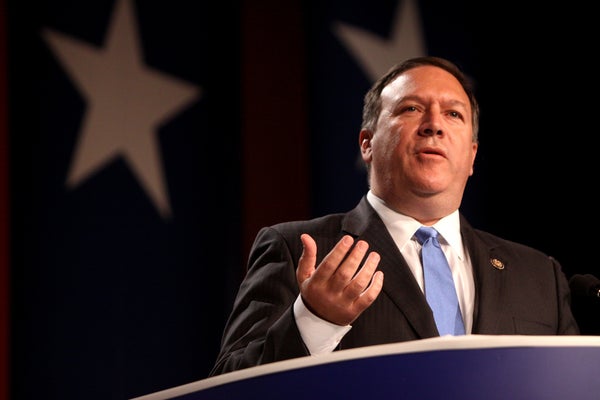President-elect Donald Trump has repeatedly called for more aggressive surveillance, particularly of Muslim communities. A look at Trump’s recently named choice to head the Central Intelligence Agency, Mike Pompeo, a Republican congressman from Kansas, suggests the incoming administration may try to fulfill those campaign pledges and expand mass surveillance programs that flourished under Pres. Barack Obama.
Pompeo introduced a bill in 2015 to restore wide spying powers to the National Security Agency that had been curbed by Congress after revelations by Edward Snowden. The legislation was too extreme both for liberals and for libertarian-leaning conservatives; it was called “Big Brother on steroids” by the Tea Party activist group FreedomWorks. It also failed to win much support from other Republicans and never made it out of committee.
As CIA director, Pompeo would run an organization primarily responsible for foreign surveillance but that also
On supporting science journalism
If you're enjoying this article, consider supporting our award-winning journalism by subscribing. By purchasing a subscription you are helping to ensure the future of impactful stories about the discoveries and ideas shaping our world today.
engages in domestic activities via collaboration with other agencies. Pompeo would inherit broad leeway to collect information on people the CIA sees as national security risks. That surveillance power does currently have limits—agencies must now make targeted requests for investigations rather than collect and store information in bulk—but Pompeo’s writings on national security indicate he would like to push the limits back.
In a Wall Street Journal opinion piece in January, Pompeo and a co-author called to for the government to restart the bulk collection of metadata: information about when and between whom e-mails and phone calls took place. Pompeo wants to eventually match these records with other types of personal information in order to build a database of intricate profiles of any American who regularly uses the internet. “Congress should pass a law reestablishing collection of all metadata, and combining it with publicly available financial and lifestyle information into a comprehensive, searchable database,” Pompeo and his co-author wrote.
It is unclear what would be included in such an unprecedented database. But far more information is publicly available than the average American might expect. A White House report on big data warned in 2014 that an entire industry exists for the sole purpose of aggregating and selling massive amounts of personal data. “Products sold on the market today include dozens of consumer scores on particular individuals that describe attributes, propensities, degrees of social influence over others, financial habits, household wealth and even suitability as a tenant, job security and frailty,” the report noted.
“We haven’t, as a society, fully grappled with how to address living in a world where so much of what we do publicly can now be aggregated and analyzed,” says Jeramie Scott, director of the Electronic Privacy Information Center’s Domestic Surveillance Project. “There’s obvious implications for our democracy and our First Amendment rights if the government can basically see and aggregate everything that’s publicly available...and make decisions about individuals.”
[Editor's note: The following paragraph was changed on November 23, 2016 to clarify that some of the legal challenges did not involve mass surveillance efforts, as the paragraph previously implied, and not all the cases were Constitutional rulings.]
There have already been legal challenges to collecting this information, says Patrick Toomey, a staff attorney with the American Civil Liberties Union. He notes the courts have agreed that certain kinds of digital searches violate legal safeguards for the privacy of citizens, some of which are contained in the Constitution's Fourth Amendment. “The government’s bulk collection of Americans’ private information has the capacity to reveal a great deal about our private lives, including our religious affiliations, our sexual preferences, our daily habits, our medical histories,” Toomey says. “And all that information is protected and subject to the constraints of the Fourth Amendment, especially when collected in bulk.”
Trump administration attempts to expand surveillance could be fought on those grounds, Toomey says. The first step to mounting a legal challenge, however, is to know what the government is actually collecting. That might be harder than it sounds, Scott says. Intelligence agencies have found loopholes that circumvented disclosure regulations before. “There’s changes that can be made essentially in secret, and every administration could potentially do that,” Scott adds. In that respect, the White House’s incoming occupants may be no different than its recent residents.
